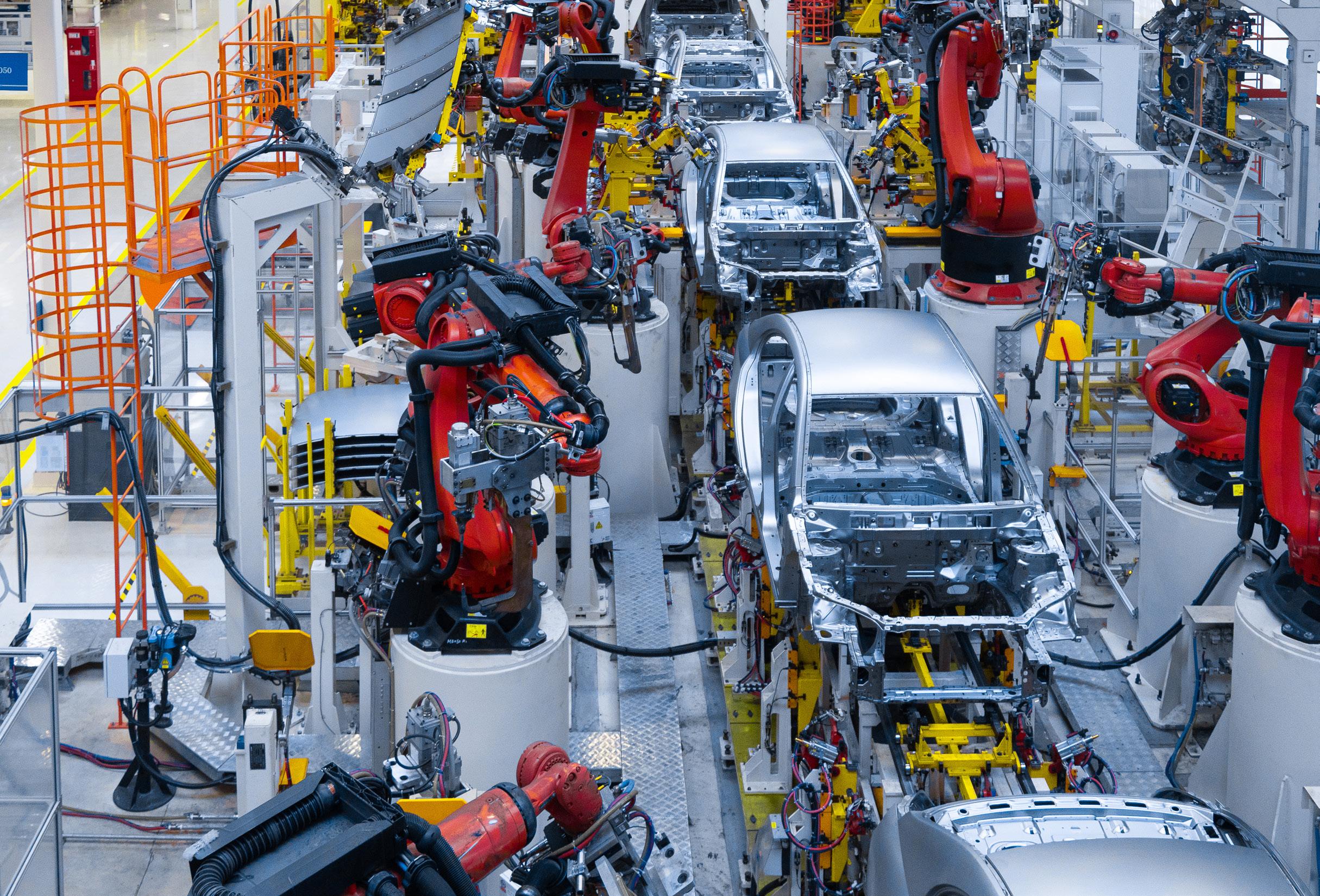
14 minute read
Cover story: Duke of Richmond
LIVING THE GOOD LIFE
Goodwood is a name synonymous with luxury, hospitality and sport, hosting key dates in the horse and motor racing calendar and describing itself as ‘an English estate like no other’. The contemporary 12,000-acre estate is home to 29 disparate businesses – ranging from organic farming to its famous Festival of Speed – and turns over around £100m a year. At its head is Charles Gordon Lennox, the 11th Duke of Richmond and Gordon, and a direct descendant of Charles II. Business Leader Magazine sat down with His Grace to discuss Goodwood’s ceaseless quest for ‘perfection’, and why his ancestors would think the modern estate ‘absolutely bonkers’…
THE HISTORY OF THE GOODWOOD ESTATE IS WELL DOCUMENTED, BUT HOW WOULD YOU DESCRIBE THE MODERN ESTATE AND ITS ACTIVITIES? Goodwood is a traditional estate, and we still have traditional estate activities at its core – property, forestry, farming – but its main area of differentiation over the past 300 years has been sport, in a very personal way. Various members of the family indulged their sporting passions, but what’s unusual is this involved sharing that passion with other people. The whole nature of the place is about shared experience, and that runs through everything we do. My dream 25 years ago – and still the same goal – was to be the world’s greatest luxury experience company. It sounds a bit unreal now, but it’s what we try to do, and we’re lucky in a sense that the experiential world has absolutely blossomed in that time. But the point of making it a success is to create a sustainable business, to create enough resource to be able to invest and support the estate. If that goes because we are so focused on other business, then we’ve lost the plot. If the family has to move out of the house and turn it into a conference centre, that would be pretty disappointing.
Goodwood Revival
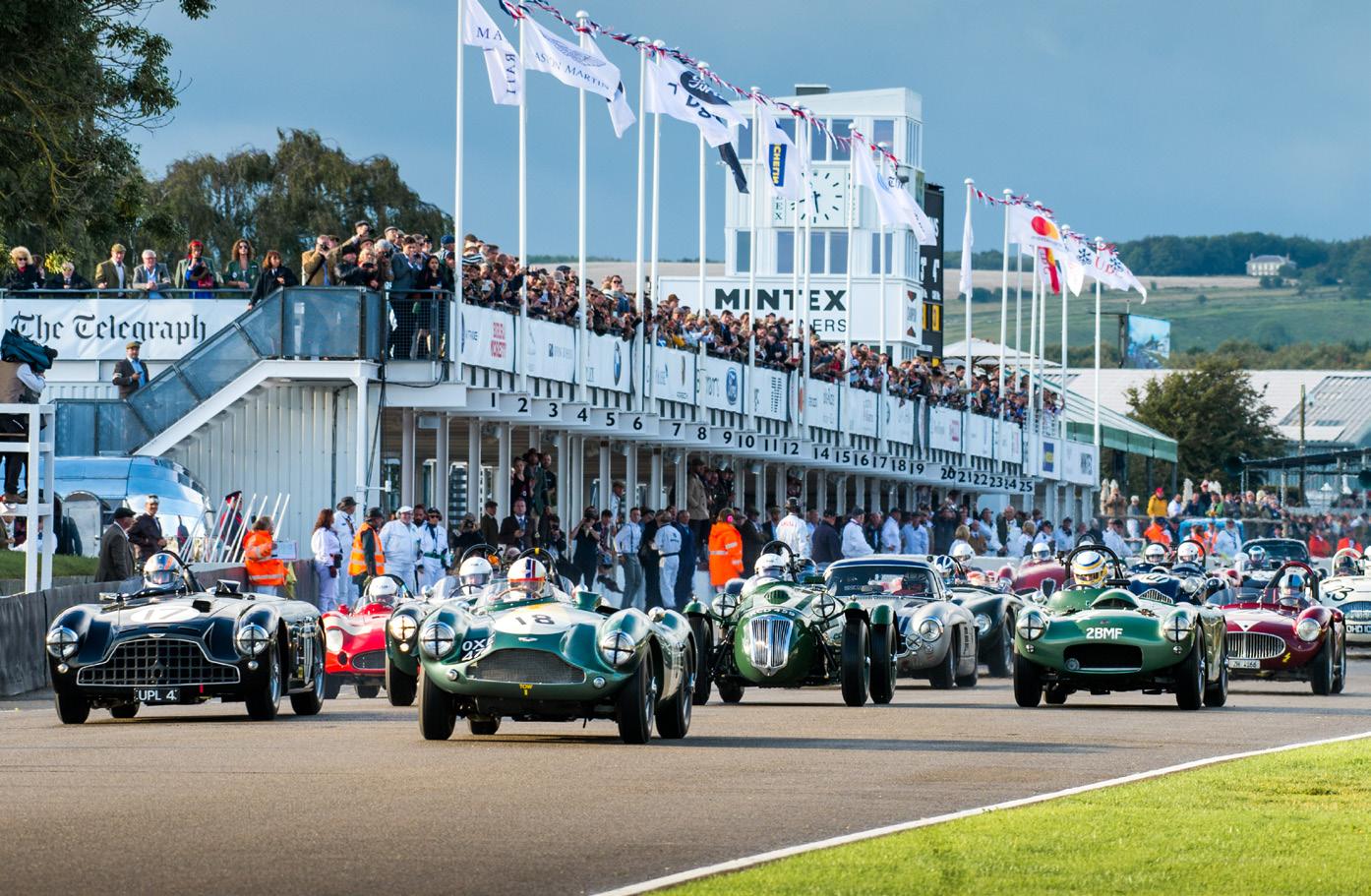
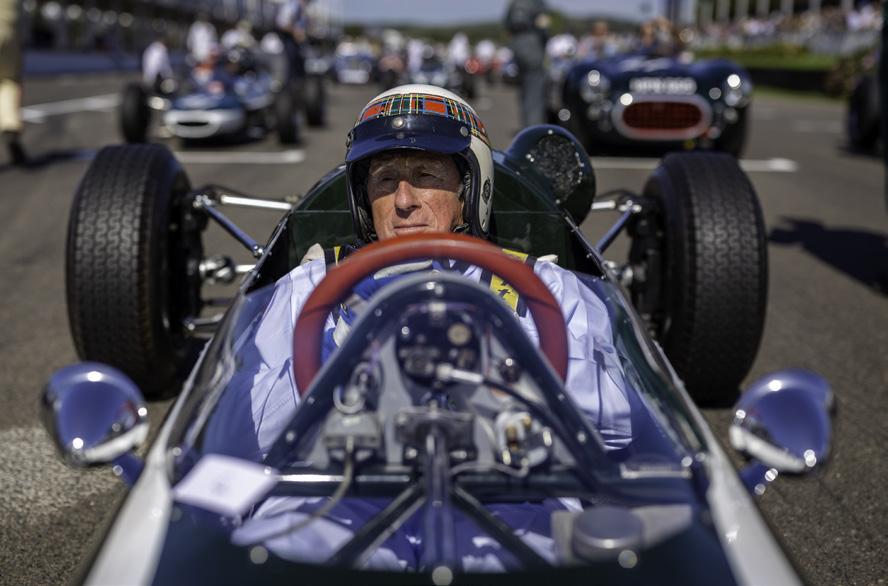
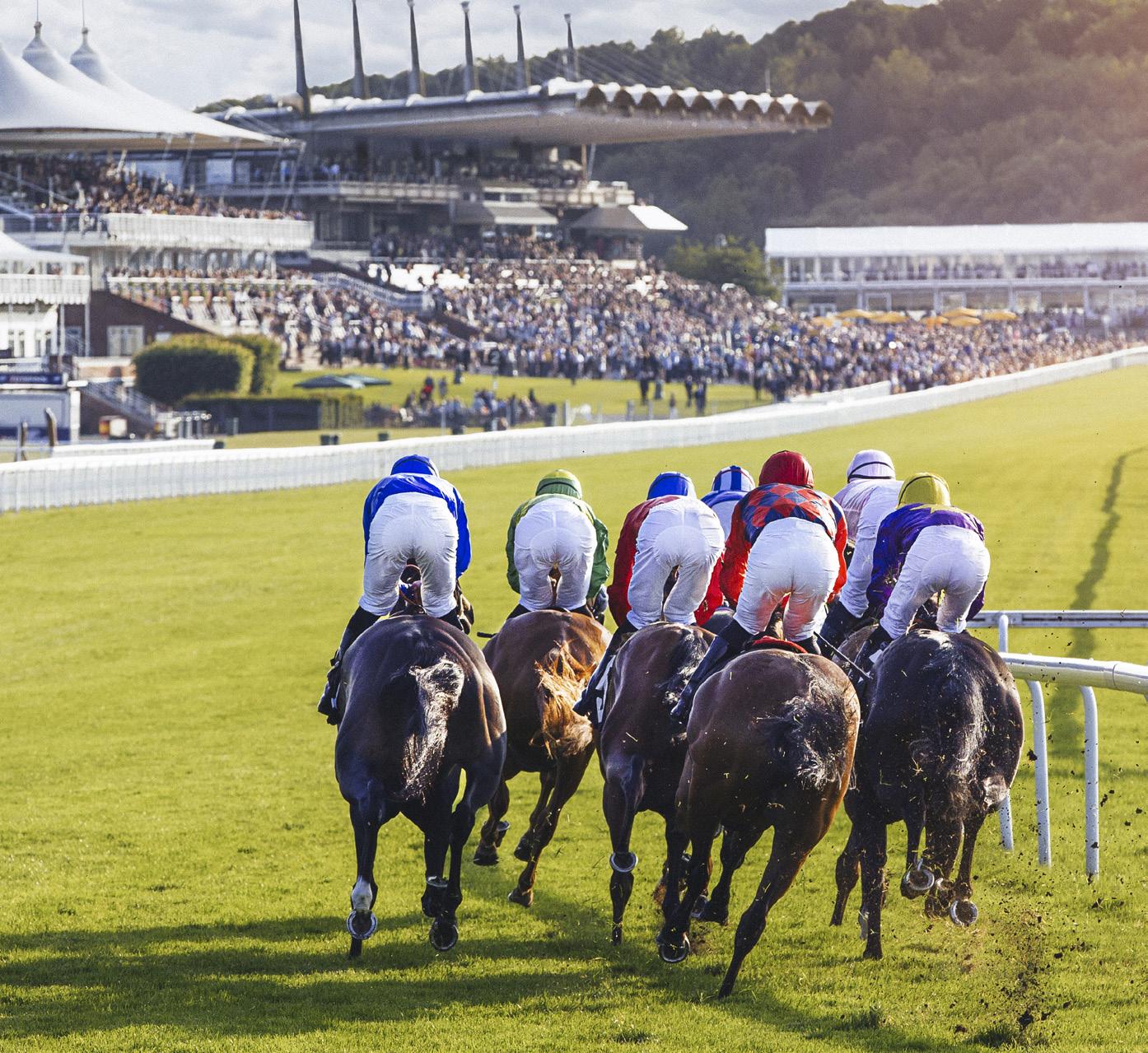
Sir Jackie Stewart taking part in the 2019 Revival
Goodwood Racecourse YOU CREDIT YOUR FATHER FOR LAYING THE FOUNDATIONS FOR MUCH OF THE MODERN BUSINESS. IN WHICH AREAS CAN HIS INFLUENCE STILL BE FELT? In 1967, when he and my mother came here, I was 12, and no-one really had been living in the house since the war. These places were considered irrelevant. Something like 1,000 houses a year were knocked down. No-one had any money, no-one wanted to keep them up, and even when people could afford to, it wasn’t considered politically the thing to do; the world had moved on. But the family had been here for 300 years, and my father was determined to keep it going. He was business trained, so he was good with numbers and the banks, which was important as we had to borrow money. And he was very, very good at putting groups of people together to get things done. These days people are much more embracing and most people are pretty positive about what goes on here; we’re doing things people want to be part of, we’re maintaining authenticity and heritage, and nowadays that’s considered to be important. And having the families and owners living in these houses and worrying about them is by far the most cost-efficient way of keeping them going. WERE YOU PREPARED FROM AN EARLY AGE TO TAKE OVER? I was involved in film and photography from the age of 16. I didn’t really love school, and I left very early. I was meant to still be in school but I wasn’t, I had got a job in London, which I loved. The idea of succession had always been managed. My father always made it clear that he wasn’t going to go on very long. So I felt good about it actually. SO THERE WAS NEVER ANY QUESTION IN YOUR MIND THAT YOU WOULD TAKE OVER? No question. I could have said no – that would have been difficult – but you have responsibilities. Succession is important in business, but it’s vital in this instance – if you don’t get the succession right, the whole thing is lost. The chances of survival are quite small really, because only one person has got to screw up and it’s all over.
My father was only encouraging. We had the idea for the Festival of Speed, for instance, and I remember saying ‘look, I have this idea, it’s not going to cost us much, I think we can spend £100,000 on it’, and he was always saying ‘let’s do it, it’s a great idea’. He was always very positive, and that is a fantastic legacy.
TO WHAT EXTENT HAS THE CONTEMPORARY ESTATE EVOLVED AS A DIRECT RESULT OF YOUR OWN PASSIONS AND AMBITIONS? I guess it’s evolved massively – but evolved is a good word to use, because we’ve tried to do everything that’s authentic to the place.
We’re lucky in that cars were easy for me, because I love them, so that was an easy door to push on. The first thing I did when I got here was to look at whether we could reopen the racetrack – it hadn’t been touched since 1966, and it was a big project.
We had the idea of the Festival of Speed, but it was a small deal compared to what it is now. We thought we might get 2,000 people and 25,000 rocked up. The fences were all smashed in, and everyone was just everywhere – but it was a good feeling, as it meant we had something. From then on, the festival was always a cash surplus. It has produced revenue from year to year, the motor industry really got behind it, and that was the big turning point. That gave us the resources to do things with. We want to be exceptional and we invest accordingly. CONTEMPORARY GOODWOOD IS A SPECIAL BLEND OF TRADITION AND MODERNITY. DOES ITS HISTORY CREATE CHALLENGES? It’s good. It’s what we do. One of our big values is around authenticity, so it’s important we don’t do things that aren’t authentic to the place.
Hence we deferred to the sports that were here originally. We can tell a great story around them, we’ve got books about them and pictures of them. I found a picture of my grandfather in the 1930s, driving his Lancia in his own event. So suddenly we were able to say that in 1934, the festival had already happened. So history is important, it has to be real, and then it’s a case of how do we make that relevant to the modern world – and I hope we do. TO WHAT EXTENT DO YOU SET THE STANDARD? I’m very involved. This morning, for instance, we had a three-hour meeting, all on motorsport, to go through details. We went through what the new catering facilities might look like this year, and some sponsors want to do different things, so we’re looking at drawings to see how that might look. How the brand feels and how it all fits together, I’m very involved.
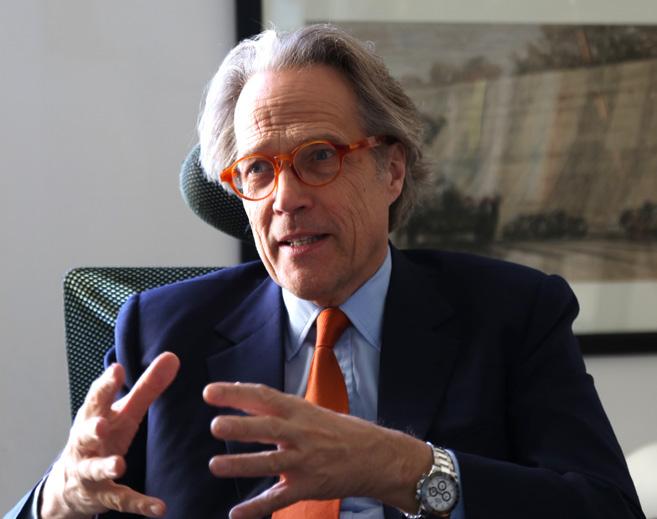
YOU RUN 29 BUSINESSES AND WORK 12-HOUR DAYS. WHERE DOES THIS DRIVE COME FROM? It’s just the nature of the beast. I’m in backto-back meetings all day, and then I have all the other stuff to do, so I end up doing that at night. But the thing is to keep up, if I’m going to be involved and be on top of things. About a million people a year now come to the estate so it’s quite a sizeable operation, and we employ 750 people. It does require a very entrepreneurial spirit. HOW DOES A WORKFORCE OF THAT SIZE – WORKING IN MANY DISPARATE FACETS OF THE BUSINESS – BECOME A TEAM? It’s interestingly diverse. We’re doing everything from aviation to organic food, all in one place; I think that’s quite a challenge for everybody. But we’ve broken it down into divisions, there’s a Managing Director of each division, and a leadership team of seven, so if I fell over tomorrow, they would run it fine, and that’s obviously important to me.
‘SHEER LOVE OF LIFE’, A SENSE OF ‘DERRING-DO’ AND AN ‘OBSESSION FOR PERFECTION’ ARE GOODWOOD'S VALUES – HOW DO YOU EMBODY THOSE VALUES? I’m a total perfectionist, so that’s the big one. First and foremost, we’ve got to do everything as well as we possibly can. Authenticity I’ve already mentioned. Derringdo? I want everyone to be creative, I’m passionate about that. It’s very unusual to have the venue, the event, and the brand, all together, and we do in all instances. All the tickets we do ourselves, all the transactional activity we do ourselves, we manage the events ourselves, and the hotel, and the golf courses. In the digital world now, you can run a hotel – globally – on your own, you don’t need a whole hotel marketing group behind you. We do it all ourselves. We have very few outsiders coming in. WHAT KIND OF RELATIONSHIP DOES GOODWOOD HAVE WITH THE WIDER SUSSEX COMMUNITY? Good. We’re a big local provider. We bring a million people a year into the area, and we’re putting half a billion pounds a year into the local economy.
Of course we’re very closely connected to Rolls-Royce. They’re a tenant. I sit on the board. They have 2,000 people. Every Rolls-Royce in the world comes from there. Between us, we are by far the biggest employer locally.
DOES IT GIVE YOU A LOT OF SATISFACTION TO KNOW YOU ARE SUPPORTING THE LOCAL COMMUNITY? Sure. The point for me is to try to maintain the community – a lot of families have worked here for hundreds of years. It’s really, really important.
But we shouldn’t just talk about now. Since the 18 th century, Goodwood has played a really important part locally. You look at these fabulous old photographs of the horse racing in the 19 th century, everyone arriving at the station, bunting everywhere, carriages in the street and everyone dressed fabulously. In a funny way, it hasn’t really changed, there’s just perhaps a bit more of it.
Cont.
YOU’RE ON RECORD AS BEING ‘WORRIED’ ABOUT BREXIT. HOW DO YOU SEE IT IMPACTING ON GOODWOOD? I am worried about it. I don’t like it, but it’s better than it was; it’s good we know where we are. Of course, we’re massively close to the car industry and it’s going to have a massive impact there. The car industry anyway is going through huge change, and that’s not going to help, so it’s a big concern. I think it’ll be difficult for a while, and then it’ll probably get better and we’ll be back where we were, but I think it’s going to take a few years to come good again. It says a lot about what we do, about the place, about long-termism. We want to produce great food, and that’s the best way to do it.
HOW DOES THAT FOCUS ON SUSTAINABILITY RECONCILE WITH EVENTS LIKE REVIVAL AND THE FESTIVAL OF SPEED? If you look at Revival and think about the whole repair, reuse, recycle concept, it fits brilliantly well. These cars may be fantastically valuable, but that’s irrelevant. The GTO Ferrari, for example. In the 1960s you couldn’t give them away for £5,000 and they were sitting in every showroom in Europe, now they’re worth $70m (£59m); it’s just an old race car, they’ve been smashed up, rebuilt, smashed up again, rebuilt, and so they just keep on going. In that sense, they’re just sustainable old things.
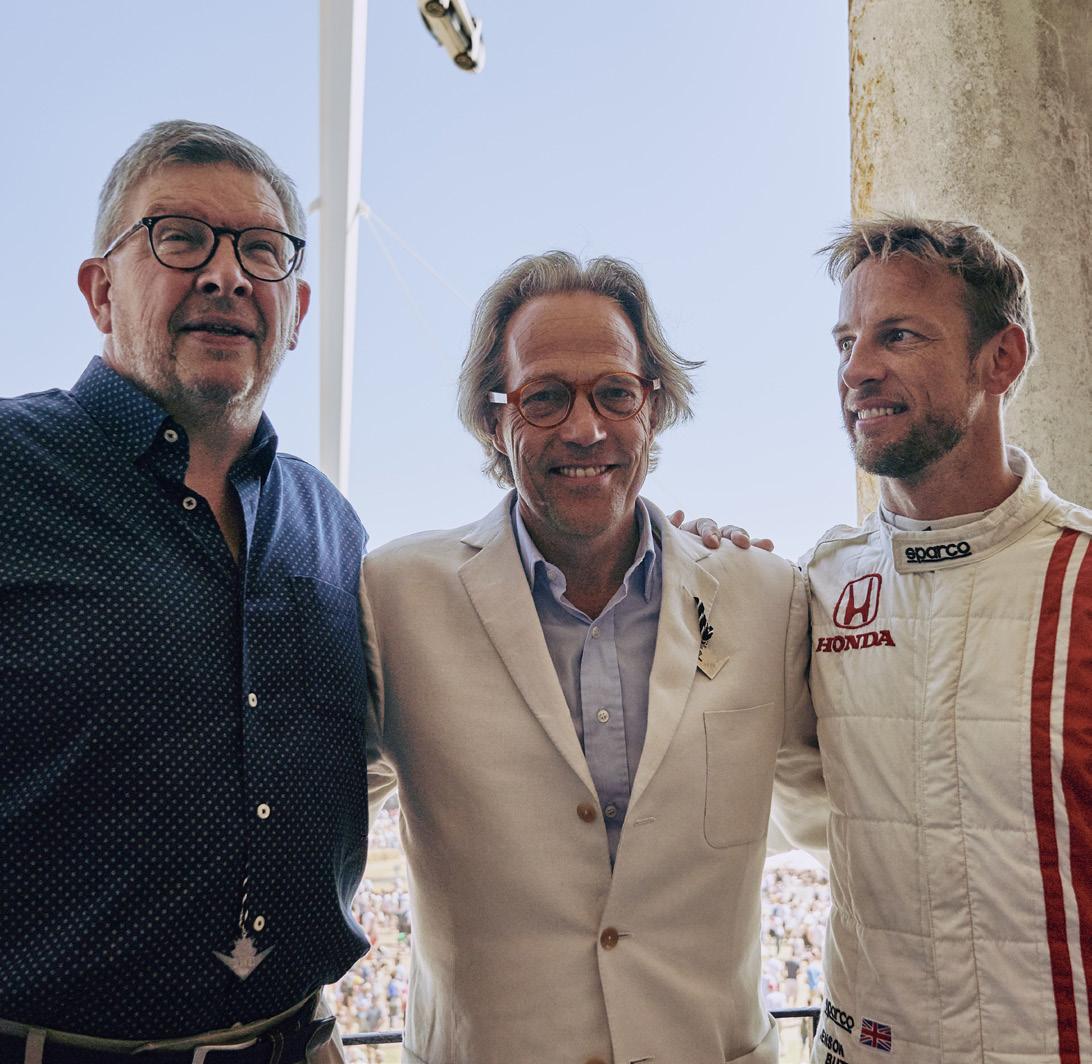
Also in terms of sustainability, the best thing to do is drive an old car rather than buy a new one, because the amount of energy involved in building a new car is way beyond the amount of energy any car ever consumes during its lifetime.
GOODWOOD’S FOOD AND DRINK OFFERING HEAVILY PROMOTES ORGANIC PRACTICE, SUSTAINABILITY AND ANIMAL WELFARE. HOW IMPORTANT ARE THESE ISSUES TO YOU? They are fundamental to the place, and very important to me. My mother ensured we were all brought up, not totally vegetarian, but with an unusually healthy lifestyle for the 1960s, which everyone thought was pretty crazy back then – now, of course, it’s just standard stuff. We had to make a choice with the farm about 20 years ago, and we decided to go organic. We have this closed-loop system where the animals are born here, live here all their lives, only eat food we grow; it’s very pure. The Festival of Speed we’ve got to make as sustainable as we can. But we’ve got Future Lab, looking at ways of doing things differently and better. Its all about mobility, connectivity, and how the motor car is going to change, what does electrification mean. What does autonomous mean. We have a big conference here on the Friday of the festival looking at all of this. We’re right at the forefront of showing what the technology is going to look like – the two fastest cars at Goodwood last year were both electric. WHAT DO YOU THINK YOUR PREDECESSORS WOULD MAKE OF THE DIVERSIFICATION OF THE CONTEMPORARY GOODWOOD BUSINESS? They would think it was all absolutely bonkers. My grandfather certainly would think the whole car stuff was absolutely (L-R) Ross Brawn with the Duke of Richmond and Jenson Button the Goodwood Festival of Speed 2018
14 barmy. They had no nostalgia, that wartime generation, they just thought all that stuff was finished, let it go.
I hope they’d be pleased or feel excited – excited by what they've created, and the way it has turned out 300 years later – and I hope they’d feel it was a natural progression of their passion. Goodwood has always been about hospitality, and all these things they did – big house parties, entertaining, having the Tsar to tea – it was all about giving people exceptional experiences.
YOU SAID AT THE OUTSET YOU WANT TO BE THE WORLD’S BEST – HOW CLOSE DO YOU FEEL YOU ARE TO THAT? We’re a long way away, I’m sure, but everyone is trying. All you can do is pick yourself up each time and have another go. And one of the challenges of running a business like this is doing just that.
The guys running our restaurants have got to do it every day – that’s a huge ask. People doing the event have a long time to wait to do it again. They can’t just say ‘that bit didn’t go so well, we’ll get that right tomorrow’ so you’ve got to really focus on what didn’t go well, really making sure you remember issues and fix them. Otherwise, every year you’ll just be putting on the same old thing and it doesn’t move on.
I see all of the complaint letters. I hate reading them, but you’ve got to take the pain, as I hate it when people don’t have a perfect experience. It’s a dagger to the heart for everyone.
WHAT AMBITIONS DO YOU STILL HAVE LEFT TO ACHIEVE FOR THE GOODWOOD ESTATE? Lots. We’ve got to keep it going in a difficult world, that’s a big challenge, and we’ve got to find new things to do. And I’ve got to have a good succession plan with my son, that’s pretty important – if I fail at that, then the whole thing’s been a waste of time.
We’re not changing the world, but we’re doing things that move people and bring people together. If we can have an impact on people in this way, that makes it all worthwhile.
Why should YOU advertise with Business Leader Magazine?
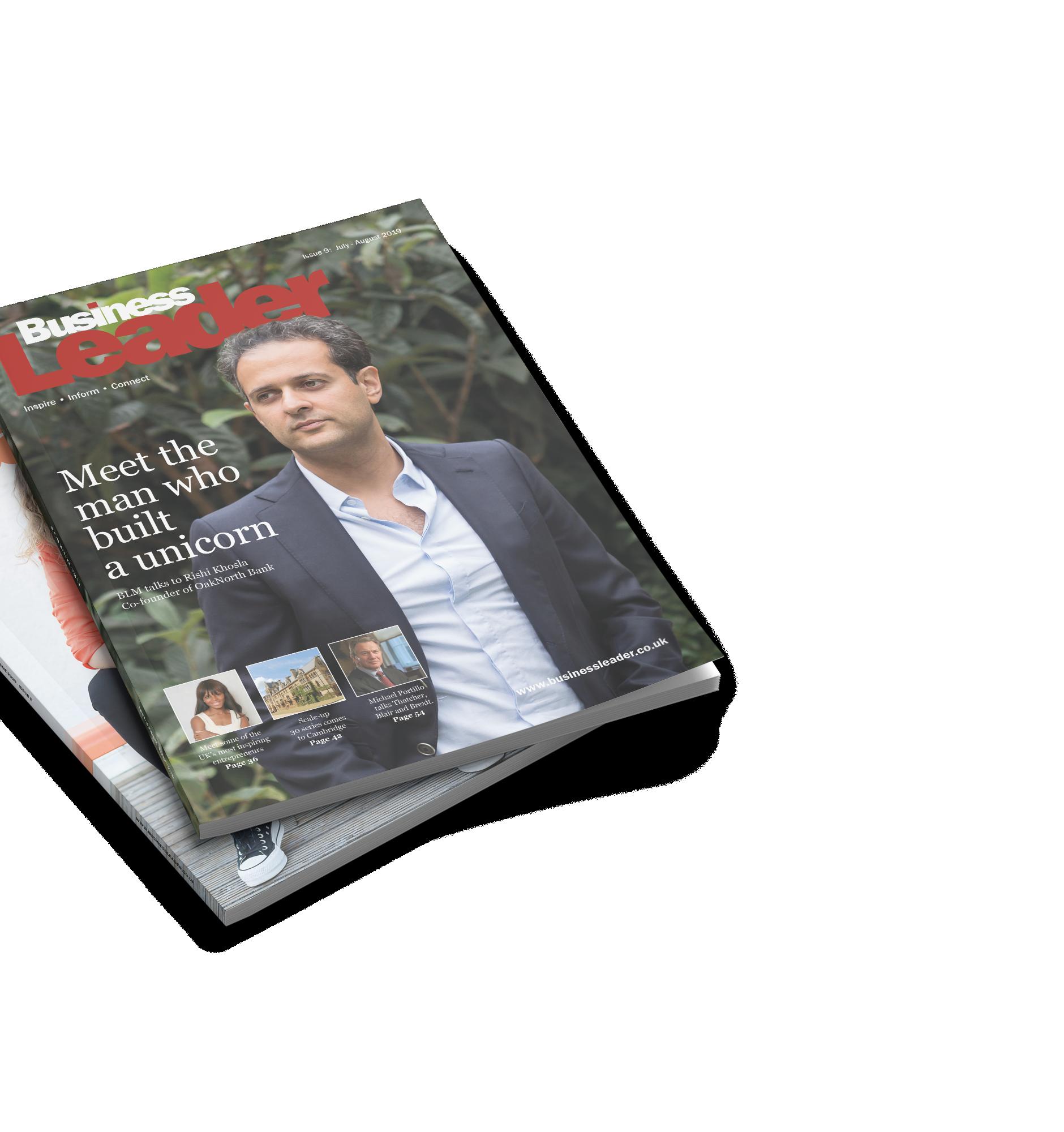
If you’re looking to connect with the entrepreneurs and business leaders that run the UK’s most successful companies – and the professionals that fuel their growth – you should consider advertising with Business Leader. Business Leader is national in its coverage, with print magazines covering the South East, South West, Midlands and the North. You can advertise in all editions to gain full national coverage or focus your content regionally.
WHAT IS THE READERSHIP OF BUSINESS LEADER MAGAZINE? The readership of the magazine is made up of Directors, CEOs and professionals in businesses that turnover between £1m and £500m. Total readership is split by regions as follows.
DISTRIBUTION PARTNERS
and many more
72,100 FOR LONDON & SOUTH EAST 46,345 FOR SOUTH WEST
27,555 FOR MIDLANDS & NORTH

